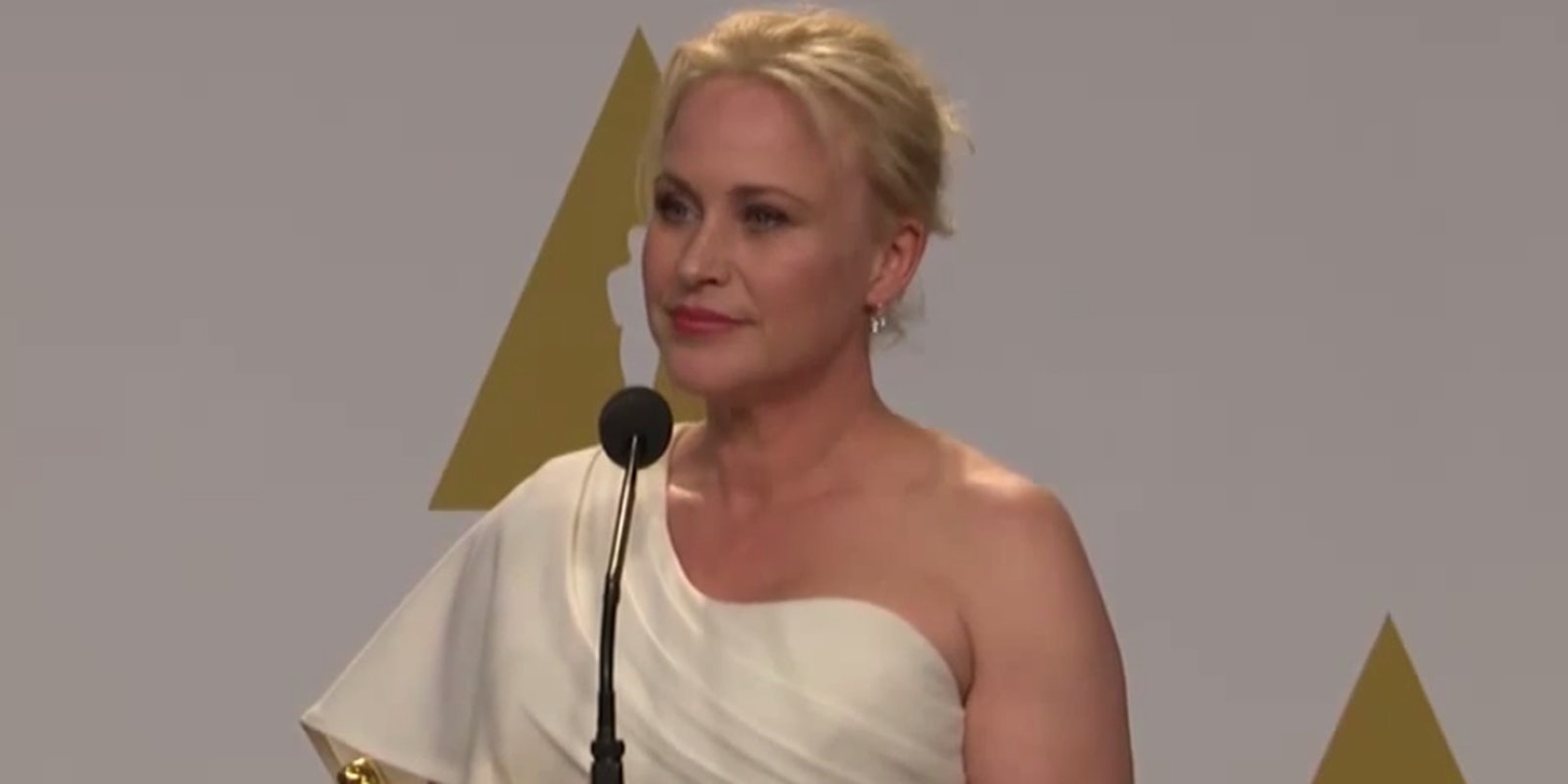Last night at the 87th Academy Awards, Patricia Arquette won the Best Supporting Actress Oscar for her role in Boyhood. But instead of thanking her agent, director, esthetician, or shaman, as most Hollywood actors do in their acceptance speeches, Arquette took her win as an opportunity to address structural sexism and gender inequality:
To every woman who gave birth to every taxpayer and citizen of this nation, we have fought for everybody else’s equal rights. It’s our time to have wage equality once and for all and equal rights for every woman in the United States of America.
It was a watershed moment in the history of women’s rights in an industry that has a nasty habit of not compensating women as much as their male counterparts, not to mention the one bright spot in an otherwise dull and self-congratulatory ceremony. In a moment that’s sure to inspire dozens of reaction GIFs, Arquette’s speech prompted Meryl Streep and Jennifer Lopez to jump to their feet and burst into applause. The blogosphere reacted equally rapturously, with Jezebel’s Clover Hope waxing effusive about Arquette’s “mic drop” of a speech, and Vulture’s Dee Lockett writing, “Meryl Streep’s reaction should be your reaction, too.”
Others, however, weren’t so impressed by Patricia Arquette, particularly when she elaborated on the message of her speech in the press room backstage: “It’s time for all the women in America—and all the men that love women and all the gay people and all the people of color that we’ve all fought for—to fight for us now.”
Not everyone was thrilled by this comment:
https://twitter.com/HegartyKatie/status/569693657823092737
https://twitter.com/ProfessorCrunk/status/569859649836584962
https://twitter.com/alex_abads/status/569743749468827648
To avoid any self-masturbatory white supremacist bullshit, I didn’t watch the Oscars. Turns out Patricia Arquette brought it in gallons.
— Olivia A. Cole (@RantingOwl) February 23, 2015
https://twitter.com/rgay/status/569737498814840832
Of course, the argument can be made (and has been made, for various other semi-problematic past acceptance speeches), that Arquette was giving an Oscars speech, not an address in front of the United Nations; because she was operating under a clear time limit, we can’t take her to task for failing to specifically address the rights of other minority groups, such as women of color and queer people, in her speech.
But the problem with Arquette’s speech wasn’t that she failed to address members of these groups, it’s that she seemed to make an explicit semantic effort to exclude them entirely, drawing a clear line in the sand between women, gay people, and “people of color.” Considering how much overlap there is between these groups, it’s unclear why Arquette would choose to explicitly place them in a separate bracket than “all the women in America”—unless “all the women in America” is just code for “all the white women in America,” as many later interpreted her comments.
If we focus specifically on the wage gap Arquette cites in her speech, data suggests that the wage gap affects women of color more than it affects white women like Arquette. As Fusion’s Arielle Castillo pointed out, African American and Hispanic women earn 53 and 64 percent, respectively, of what a white man makes for the same job, compared to 78 percent for white women. It’s also much harder for women of color to get hired for a job in the first place, with women of color having the highest unemployment rate in the public sector at 10.7 percent. (That number has stayed largely stagnant for the past few years, even while unemployment rates for other demographics, such as white women, have plummeted.)
If you look at these numbers without even addressing the deeply entrenched social inequities and subtle microaggressions that women of color face every day, it’s pretty outrageous for Arquette to make such a clear distinction between “women” and people of color when the latter group is impacted far more by structural inequalities than the former. In light of the suggestion that it’s “time” for POCs and queer people to take up the mantle and pay white feminists back for all the work they’ve done fighting for them, it’s easy to see why people would take umbrage with Arquette’s speech.
In some ways, the response to Arquette’s speech in feminist circles on the Internet was emblematic of the general rift between mainstream white feminism and intersectional feminism, a tension that’s become all the more apparent thanks to the ongoing boxing ring color commentary that is Feminist Twitter. Through a white feminist lens, a middle-aged actress calling for an end to the wage gap in front of a Hollywood old guard audience is nothing short of revolutionary. However, from the perspective of a queer person or woman of color, this message, coming from a woman who earns far more than many women of color will ever see in a lifetime, reads as exclusionary and disingenuous, not to mention insulting.
It’s great that feminists on the Internet, not to mention Meryl Streep and J-Lo, were so excited by Arquette’s call to end the wage gap. But by failing to read between the lines of what that message means and who it predominantly benefits, we’re not just doing a disservice to people of color and queer people and all the marginalized groups Arquette is asking to rally behind us. We’re doing a disservice to feminism in general.
Screengrab via PopSugar/YouTube


